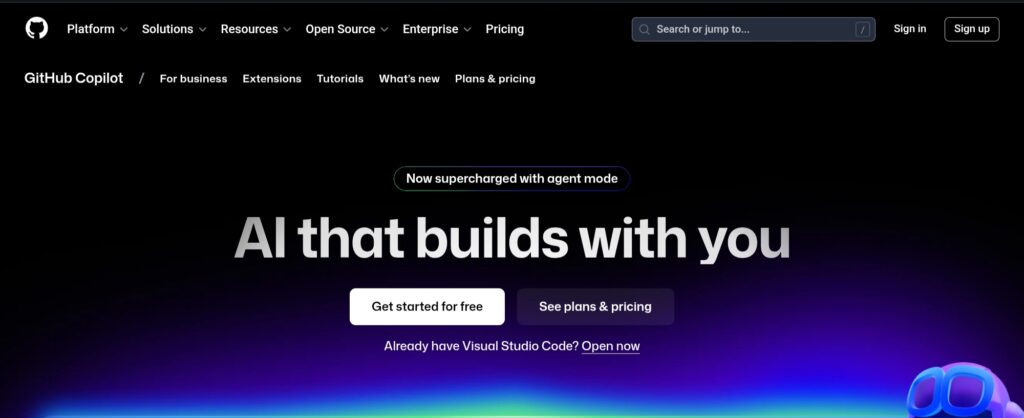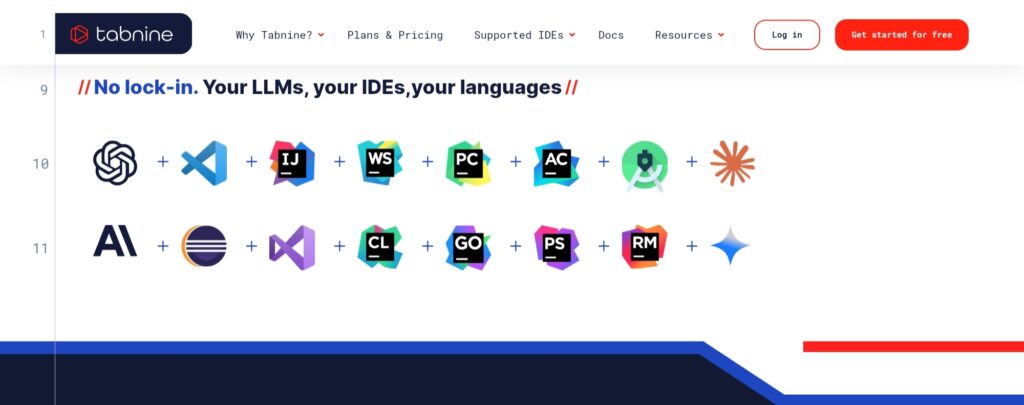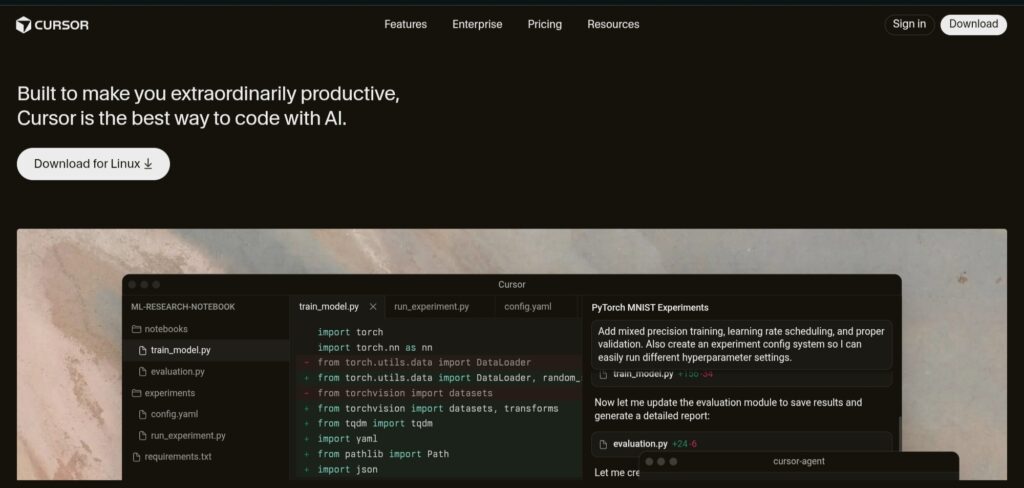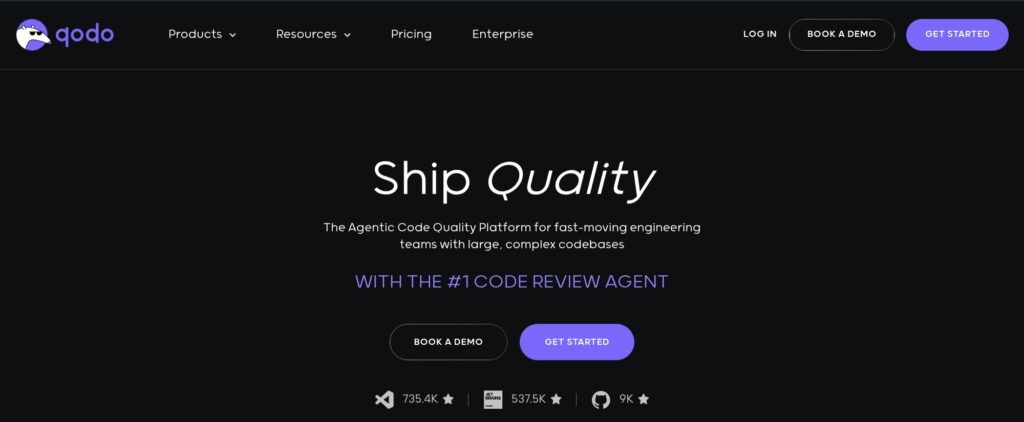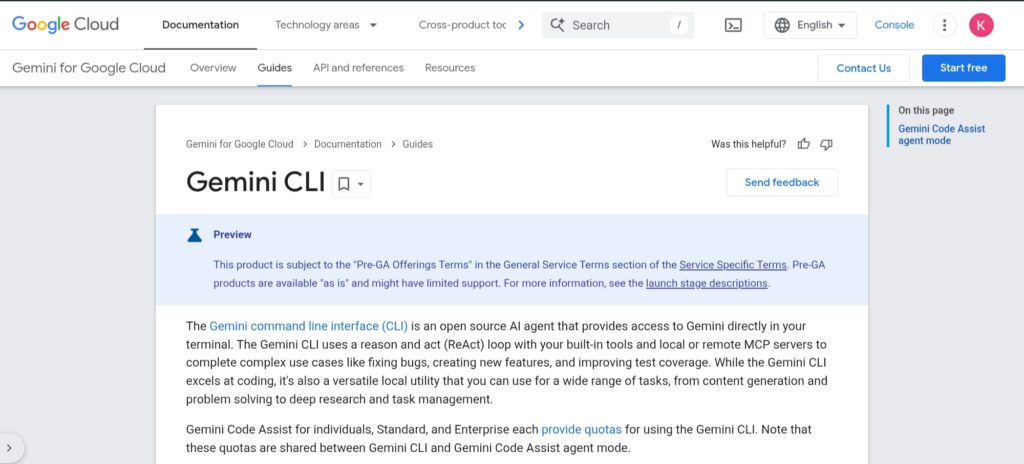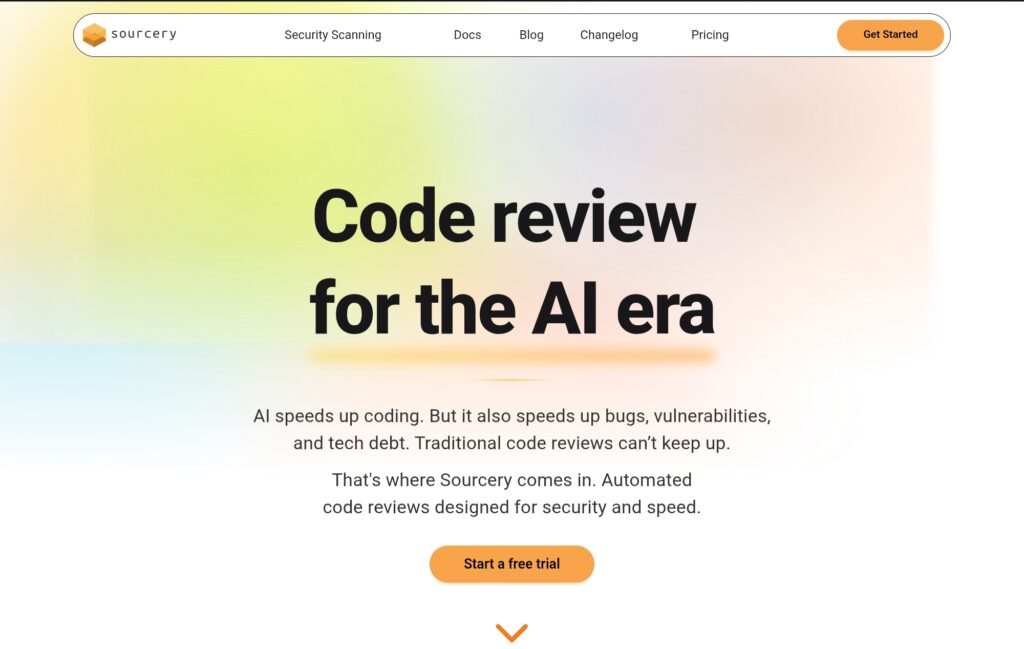Artificial intelligence is actively changing how programmers write code today; it is no longer a sci-fi idea.
Programming is becoming a quicker, smarter, and more efficient process thanks to AI-assisted coding tools, which range from intelligent code completion to automatic debugging suggestions.
It is no longer necessary for developers to become mired in monotonous work or search through copious amounts of documentation for answers.
You can focus on creativity and problem-solving instead of tiresome routine work by using AI in programming to save time, decrease errors, and write smarter code.
Whether you’re developing intricate applications, testing out novel frameworks, or refining already-existing projects, AI-powered solutions can greatly increase your output and improve your workflow.
In this post, we’ll look at seven game-changing AI coding tools that you need to know about.
Each is designed to help developers streamline their jobs, produce cleaner code, and enjoy programming more.
From clever code completion helpers to AI-powered debugging tools, these solutions are transforming the developer experience and could become your new coding partners.
How to Choose the Right AI Coding Tool
There are a lot of AI-assisted coding tools available, making it difficult to choose one. Focusing on tools that complement your programming language, workflow, and productivity objectives is crucial. These are the primary elements to take into account.
1. Programming Language Compatibility
Not every programming language is supported by every AI coding tool. While some may support several languages, some are tailored for well-known languages like Python, JavaScript, or Java.
Make sure a tool is compatible with the language or languages you use most often before choosing it. This guarantees that you receive precise code recommendations and the greatest possible productivity gains.
2. Integration with IDEs
The effectiveness of a sophisticated AI tool depends on how well it integrates with your development environment.
Make sure that the tool can connect to your editor without interfering with your productivity, regardless of whether you use JetBrains, Visual Studio Code, or another IDE.
Debugging, auto-completion, and real-time code suggestions are all made possible via native integration, which takes place right in your workspace.
3. Features
There are differences in the capabilities of various AI coding tools. Some offer debugging support, code testing, or documentation creation, while others concentrate only on code completion.
Determine which characteristics are most important for your daily tasks and projects. For instance, context-aware recommendations and error detection can save hours of work if you often work on huge codebases.
4. Cost and Subscription Model
AI coding tools are available in both free and premium subscription forms. Think about your spending plan and whether the tool’s increased productivity makes it worth the money.
Before deciding on a subscription plan, some programs provide community editions or free trials, which are ideal for testing.
You can select solutions that genuinely increase your productivity, lower coding errors, and blend well with your development workflow by analyzing AI coding tools according to these criteria.
List of the Game-Changing AI Coding Tools
Here is my list of the top 7 AI Coding Tools used by most developers. Read till the end to view my bonus tools for AI-assisted coding.
1. GitHub Copilot
GitHub Copilot is an AI-powered code completion tool created by GitHub in collaboration with OpenAI.
It serves as an intelligent programming assistant, recommending code completions, whole functions, and even complex algorithms in real time as developers type.
Built on OpenAI’s Codex model, Copilot has been trained on billions of lines of public code from GitHub repositories, allowing it to recognize context and give meaningful code suggestions in dozens of programming languages.
Key Features
Real-time code suggestions that show up in your editor as you type are one of the tool’s primary features.
It supports well-known IDEs like Visual Studio Code, JetBrains IDEs, Neovim, and Visual Studio.
Copilot is capable of translating code across several programming languages, producing whole routines from basic comments, and offering several possible approaches to the same issue.
Additionally, it has chat features that let developers ask questions about their code, seek clarifications, or get debugging assistance.
More than 30 programming languages are supported by the tool, including Python, JavaScript, TypeScript, Ruby, Go, C#, and C++.
Benefits for Developers
By cutting down on time spent on repeated activities and boilerplate code, GitHub Copilot helps developers write code much faster.
It is especially helpful for junior developers learning new languages or frameworks because it indicates best practices and contemporary coding patterns, which assist in eliminating knowledge gaps.
Because the technology frees developers from having to worry about syntax, they can concentrate on addressing more complex problems.
Frequently recommending cleaner or more effective solutions than developers might first think of, it also functions as a great learning tool.
Pricing

GitHub Copilot’s free plan has a cap of 2,000 completions per month and 50 premium requests; it is not an unlimited plan.
Additionally, GitHub Copilot provides new users with a 30-day free trial.
Individual subscriptions cost $10 per month or $100 annually after the trial period.
Additionally, consumers can purchase a Pro+ subscription for $39 per month or $390 annually.
GitHub Copilot Business, which offers extra features including enterprise-grade security and policy administration, is priced at $19 per user per month for enterprises.
For organizations, there is an Enterprise subscription that costs $39 per user per month.
GitHub’s education and open-source initiatives provide free access to GitHub Copilot for educators, students, and maintainers of well-known open-source projects.
2. TabNine
Across a variety of programming languages and development environments, TabNine is an AI-powered code completion tool that offers intelligent autocomplete recommendations.
TabNine predicts and recommends the most pertinent code completions depending on context by using deep learning models that have been trained on millions of open-source code repositories.
As it gains knowledge of a developer’s coding habits, the tool is made to adjust to different coding styles and project-specific patterns, gradually improving in accuracy and personalization.
Key Features
One of TabNine’s most notable features is that it works with more than 30 IDEs and editors, including VS Code, IntelliJ IDEA, Sublime Text, Atom, and Vim.
Both on-premises and cloud-based deployment options are available for the platform; the latter offers improved security for business settings.
Unlike single-word suggestions, TabNine can comprehend context across different files in a project and provides whole-line and full-function completions.
By comprehending the logic and intent behind code patterns, the tool offers semantic code completions that go beyond conventional text matching.
Organizations can train models on their own codebases to get more pertinent recommendations thanks to their team training features.
Benefits for Developers
By offering extremely accurate predictions that frequently anticipate entire code blocks before they are created, TabNine helps developers drastically cut down on the amount of time they spend writing.
Through its ability to recognize and recommend existing patterns and conventions utilized within certain projects or organizations, the tool aids in maintaining coding consistency across teams.
Code security is guaranteed by its privacy-focused approach, particularly with the on-premise option that retains all data within the company’s infrastructure.
Additionally, TabNine eases the cognitive load by managing repetitive coding processes, freeing developers to concentrate on intricate problem-solving and architectural choices.
Pricing
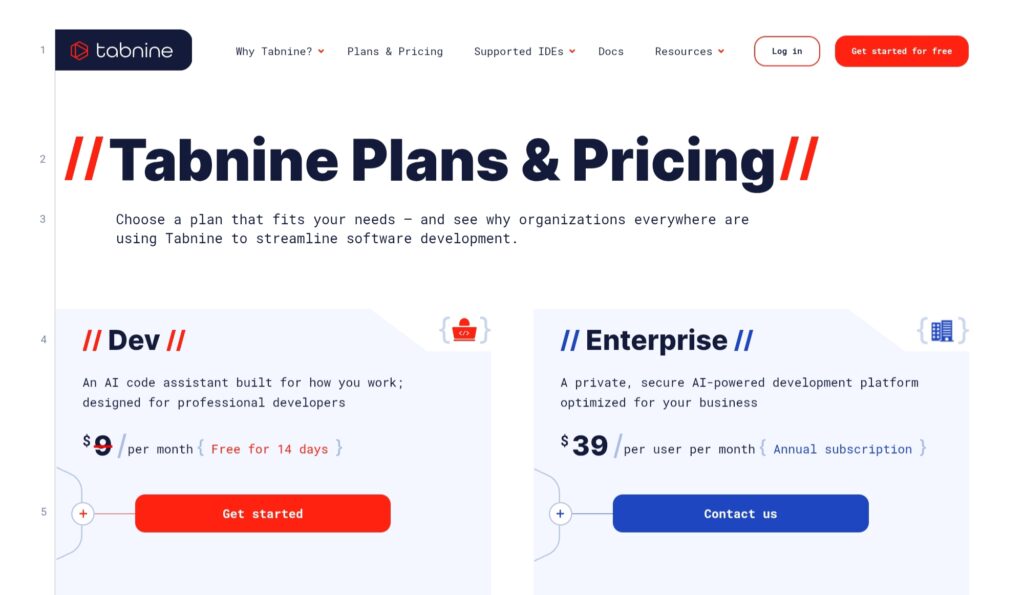
Dev Preview is a 14-day free tier that includes all of Dev’s features offered by TabNine.
For $9 a month, the Pro package for individuals (also known as Dev) offers unlimited usage, priority support, and sophisticated AI models.
Other capabilities that TabNine offers to teams and businesses include team analytics, on-premise deployment, and the capacity to train models on proprietary codebases. The monthly cost is $39 per user.
Dedicated assistance and unique integrations catered to their development processes are additional advantages available to enterprise clients.
3. Amazon CodeWhisperer/ Q Developer
An AI-powered coding assistant called Amazon CodeWhisperer was created by Amazon Web Services and offers real-time code recommendations and suggestions right into developers’ integrated working environments.
CodeWhisperer, which is based on machine learning models that have been trained on billions of lines of code, including the internal codebase of Amazon, is made especially to be excellent at producing code that complies with AWS best practices and works in unison with cloud services.
Based on contextual awareness of developers’ goals, the tool can produce full functions, classes, and code blocks, and comprehend natural language comments.
Key Features
Intelligent code generation is one of the platform’s primary features; it can produce large code blocks from basic comments or incomplete code inputs.
For enterprise development, CodeWhisperer is especially useful because it has integrated security scanning that finds possible vulnerabilities and recommends fixes.
By displaying instances in which generated code may resemble publicly available code and offering attribution details, the program offers reference tracking.
C#, Go, Rust, PHP, Ruby, Kotlin, Python, Java, JavaScript, TypeScript, Shell scripting, SQL, and Scala are among the more than 15 programming languages that it supports.
Additionally, CodeWhisperer comes with tailored optimization for cloud service integration patterns and AWS SDK usage.
Benefits for Developers
Because CodeWhisperer produces high-quality, AWS-optimized code that adheres to cloud best practices, it speeds up development velocity for developers.
Teams can reduce security debt and enhance overall code quality by identifying and fixing possible vulnerabilities early in the development cycle with the use of integrated security scanning.
Because the tool offers contextually aware recommendations for cloud architecture patterns and service connectors, developers working with AWS services will find it very helpful.
CodeWhisperer’s recommendations for appropriate implementation patterns and parameters also aid in lowering the learning curve for new AWS services.
Pricing
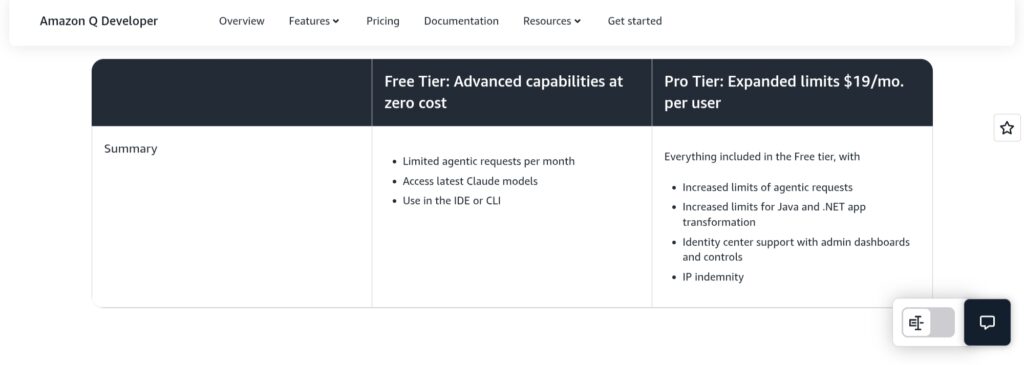
With its generous free tier, Amazon CodeWhisperer gives 1,000 lines of code per month, 50 Agentic requests per month, reference tracking, and the ability to suppress public code suggestions.
Additional capabilities, including support for single sign-on (SSO), policy management for companies, unlimited security scans, etc., are included in the pro tier, which costs $19 per user per month.
Advanced administrative controls and integration with AWS Identity and Access Management (IAM) are also available to enterprise customers for increased security and compliance needs.
4. Claude
Claude is a sophisticated artificial intelligence (AI) assistant developed by Anthropic that can comprehend, generate, debug, and explain code in almost any programming language.
In contrast to conventional code completion tools, Claude is a conversational AI that can use natural language interaction to help with complex programming problems, conduct in-depth discussions about software architecture, and offer thorough code evaluations.
Claude is especially dependable for enterprise development contexts where accuracy and safety are crucial because it is based on Constitutional AI concepts.
Key Features
With a thorough grasp of syntax, semantics, and best practices spanning dozens of programming languages and frameworks, Claude offers extensive multi-language programming support.
Complete applications, code reviews, debugging, and thorough explanations of intricate algorithms and design patterns are all capabilities of this AI tool.
Claude is very good at restructuring legacy systems, translating requirements from natural language into functional code, and offering architectural direction for major projects.
Additionally, the program can evaluate codebases for security flaws, provide performance enhancements, and assist in creating documentation.
Claude is also capable of working with a variety of file types, analyzing databases, and supporting infrastructure-as-code and DevOps deployments.
Benefits for Developers
As a coding assistant that can be tailored to any development workflow or methodology, Claude provides developers with unmatched freedom.
Because of its conversational style, developers can discuss solutions and gain justifications for why particular methods are suggested over others.
Because it can offer thorough lectures, clarify difficult ideas, and provide practical coding examples, Claude is very helpful for learning new technologies.
The AI assistant offers code review input and mentorship-style coaching to help close the gap between rookie and veteran developers.
It is great for maintaining huge codebases and implementing complicated features that span various files and systems because of its capacity to comprehend context across whole projects.
Pricing

Claude is available in a number of tiers, including a free plan that offers significant use for hobbyists and independent developers.
For $20 a month, you can get Claude Pro, which has higher usage caps, priority access during busy periods, and early access to new features.
Anthropic provides Claude Team, which includes collaboration tools, early access to new features, and higher usage restrictions, for teams and businesses for $25 per user per month (minimum of 5 users).
Claude is available to enterprise clients via API integration, with customized pricing based on usage volume, improved security features, specialized support, and service level agreements catered to the requirements of the company.
5. Cursor
Cursor is a code editor that prioritizes artificial intelligence and was designed from the ground up to smoothly include AI into the software development process.
In contrast to conventional IDEs that use AI plugins, Cursor is built with AI at its heart, providing a native coding experience that allows developers to write, modify, and comprehend code by interacting with AI using natural language.
The editor’s familiar functionality is guaranteed by its base in Visual Studio Code, which also adds potent AI features that revolutionize developers’ approaches to coding chores.
Cursor intends to increase the efficiency and accessibility of programming by enabling developers to communicate their ideas in plain English and having the AI convert them into functional code.
Key Features
One of the most notable features of the platform is its Chat feature, which enables developers to conduct contextual discussions about their whole codebase, ask questions about certain functions, receive explanations of intricate code parts, or propose changes to implementations that are already in place.
Composer mode, which Cursor offers, is perfect for creating features that extend across several sections of an application because it can create and modify multiple files at once using natural language instructions.
Advanced auto-completion offered by the editor goes beyond straightforward recommendations to enable intelligent code generation based on purpose and context.
Developers can accept AI suggestions with a single keystroke thanks to tab completion, and they can pick code and describe changes they wish to make in natural language by using the cmd+K shortcut.
Benefit for Developers
Cursor helps developers spend less time on repetitive coding activities by letting them concentrate on high-level problem solving and architectural choices instead of syntax and implementation specifics.
Instead of manually coding every line of code, developers may quickly iterate on concepts by specifying functionality, which makes the tool especially useful for rapid prototyping.
Because developers may ask questions about existing code and receive immediate answers, Cursor helps remove knowledge gaps while dealing with unknown codebases.
The editor is also a great learning tool, with its insightful explanations and recommendations assisting developers in comprehending contemporary code patterns and best practices.
Pricing

For small applications and individual developers, Cursor provides a free tier with usage restrictions that contains basic AI capability.
The Pro subscription, which costs $20 a month, offers more advanced capabilities, including limitless rapid completions, priority access to new models, and higher AI usage caps.
At $40 per user per month, Cursor provides a Business plan for teams that includes improved security measures, centralized billing, and team collaboration tools.
Enterprise-grade options with customized pricing are also offered by the platform to businesses that need specialized support, compliance requirements, and superior security.
6. ChatGPT
ChatGPT, the conversational AI assistant from OpenAI, has grown to be one of the most popular and adaptable tools for software development and coding support.
Though not specifically made as a coding tool, ChatGPT is excellent at comprehending programming concepts, producing code in a variety of languages, troubleshooting problems, and offering thorough explanations of intricate software development subjects.
ChatGPT is based on sophisticated language models, such as GPT-4 (the most recent version of GPT-5), and can converse about code in natural language, convert requirements into workable implementations, and act as an intelligent educator and consultant for developers of all technical backgrounds.
Key Features
Comprehensive multi-language programming support, which allows code generation, debugging, review, and explanation in almost any programming language or framework, is one of the platform’s primary characteristics.
ChatGPT can undertake code reviews with thorough feedback, build complete applications from scratch using natural language descriptions, and assist in improving current implementations for readability or efficiency.
The tool is useful for learning new technologies since it does a great job at describing intricate programming principles, algorithms, and design patterns in an understandable manner.
Writing documentation, creating test cases, optimizing database queries, and planning system architecture are additional tasks that ChatGPT may help with.
In order to offer contextual support, the platform can evaluate existing codebases, configuration files, and technical documentation, and allows file uploads.
Benefits for Developers
ChatGPT acts as an always-available programming mentor for developers, offering guidance on best practices across many domains, alternative implementation strategies, and assistance with coding problems.
Because of its conversational character, developers can refine requirements and test out various technical techniques before implementing a solution.
The tool can offer detailed explanations, real-world examples, and interactive coding exercises, making it especially useful for learning new programming languages, frameworks, or technologies.
By decomposing difficult technical problems into digestible parts and offering methodical implementation strategies, ChatGPT also aids with problem-solving.
Pricing
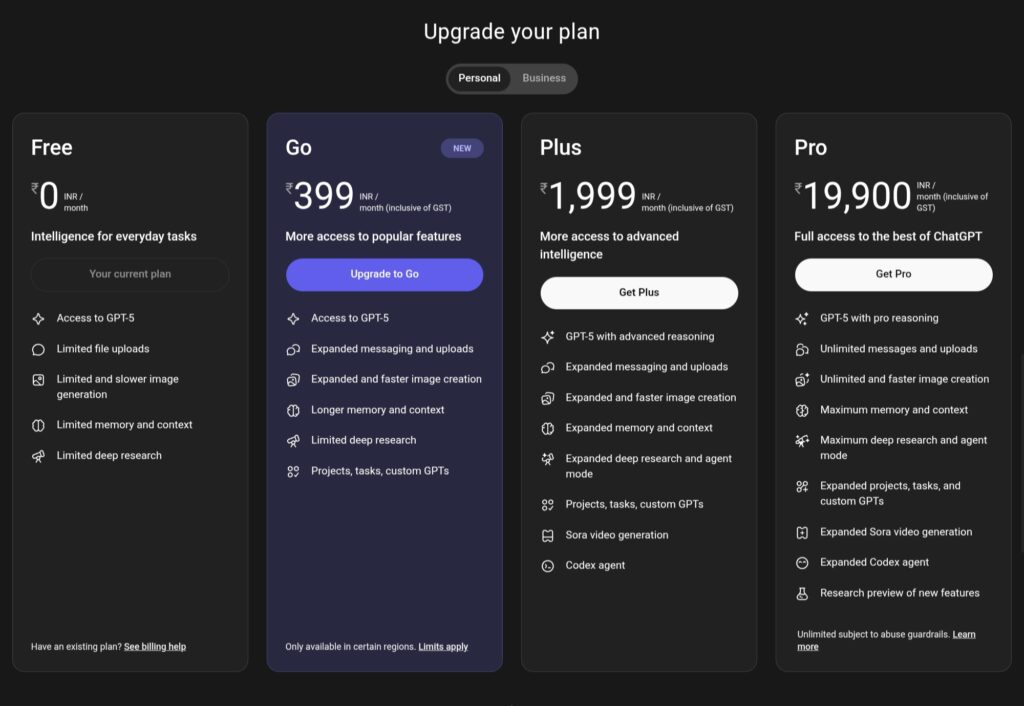
For students and casual users, ChatGPT offers a free tier that grants access to GPT-5 with limited usage and minimal features. The cost of using ChatGPT Go is INR 399 per month.
Access to GPT-5, quicker response times, priority access during periods of high traffic, and early access to new features and enhancements are all included in ChatGPT Plus, which costs INR 1,999 per month.
With its full functionality, ChatGPT Pro costs INR 19,900 per month.
For teams and businesses, ChatGPT Business offers complete access to ChatGPT features, team collaboration tools, improved data privacy controls, and more for INR 2,099 per user per month (not including GST) (minimum of 2 users).
7. Qodo
The goal of the quality-first AI coding platform Qodo (previously Codium) is to assist developers in writing, testing, and reviewing code with more dependability and fewer errors.
The platform offers a number of specialized tools that collaborate to enhance code quality across the software development lifecycle, taking a holistic approach to AI-assisted development.
With the aid of intelligent, adaptable agents and Retrieval Augmented Generation (RAG) technology, Qodo assists developers in creating high-caliber code that functions as intended while adhering to team best practices.
Key Features
The two main products of Qodo are Qodo Gen, an IDE plugin for AI code generation and testing that includes agents for code generation, test workflows, and AI chat, and Qodo Merge, an AI-powered code review tool that expedites reviews in Git, helps developers find bugs early, and automatically generates PR descriptions.
A multi-agent architecture is used by the platform, with one agent handling code generation, another testing, a third enforcing compliance, and a fourth conducting structured reviews.
Qodo’s sophisticated AI models produce comprehensive test cases, guaranteeing thorough testing in a range of scenarios.
The platform is compatible with several IDEs, such as Visual Studio Code and JetBrains IDEs.
Features like the /implement command, which can apply proposed modifications directly, are included in Qodo Merge, which can automatically produce precise code changes from review comments.
Benefits for Developers
By prioritizing code quality and dependability over speed alone, Qodo offers developers substantial value.
This makes it especially useful for teams that value solid, well-tested code.
To increase efficiency and code quality, the platform provides AI code reviews, AI testing, and AI code generation via Retrieval-Augmented Generation (RAG).
The extensive test-generating features aid in ensuring complete code coverage and identifying possible problems before they are brought to production.
Qodo is particularly helpful in business settings where upholding coding standards and quality gates is essential because of its emphasis on adjusting to team behaviors and enforcing compliance.
Developers can take advantage of specialized AI support for various stages of the development process thanks to the platform’s multi-agent methodology.
Pricing
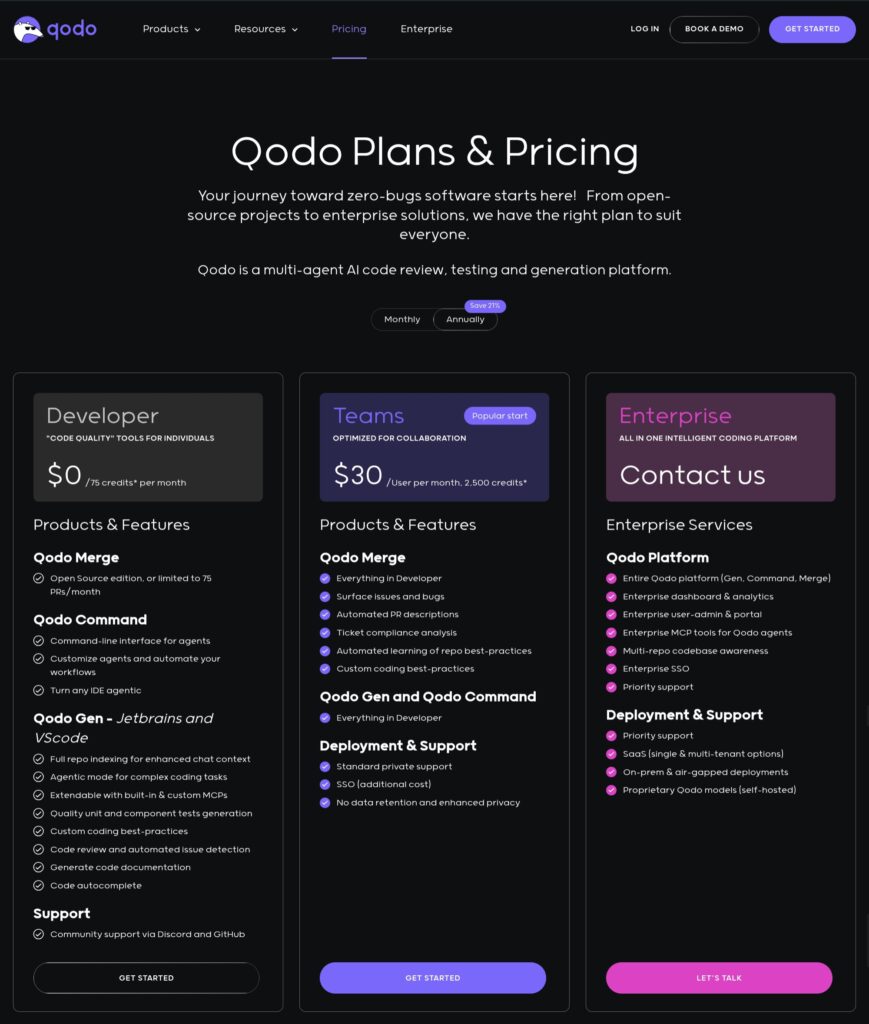
Following the core idea of providing individual developers with all the resources they need, Qodo provides products at no cost to individual developers, with money coming from Teams and Enterprise plans.
With features like code review, test generation, documentation, repository context chat, and many model possibilities, the Developer tier is entirely free for individual users (75 credits per month).
At $30 per user per month with yearly plan ($38 per month), Qodo provides a Teams plan for teams that includes 2,500 credits, PR descriptions, ticket compliance, best-practice learning, and standard support with optional SSO.
For larger enterprises needing sophisticated security and compliance capabilities, enterprise customers can access unique pricing that includes full platform access and additional enterprise-grade features.
Bonus AI Coding Tools
As I said earlier, here are the bonus AI coding tools that you need to know about before selecting the perfect tool for your development needs.
8. Gemini CLI
For developers who prefer command-line interfaces and terminal-based workflows, Gemini CLI is an open source AI agent that lets you use Gemini right in your terminal.
Bringing Google’s cutting-edge AI models to the command line environment, Gemini CLI provides you with direct access to Gemini for coding, content creation, problem-solving, and more.
Google’s answer to existing terminal-based AI coding tools, the tool runs directly in your terminal, comprehends your codebase, and uses natural language suggestions to assist you in fixing bugs.
Key Features
With a 1M token context window and integrated utilities like web fetching, file operations, shell commands, and Google Search foundation, the platform provides robust Gemini 2.5 Pro access.
To accomplish complicated use cases like repairing problems, adding new features, and enhancing test coverage, the Gemini CLI leverages a reason and act (ReAct) cycle with integrated tools and local or distant MCP servers.
The tool is meant to be terminal-first for developers and is expandable with support for custom integrations via MCP (Model Context Protocol).
When linked to Visual Studio Code, Gemini CLI can access your workspace directly, recognize open files, and retrieve specific text to make suggestions that are pertinent to the context.
Advanced capabilities include support for multiple Model Control Points (MCPs) for task-specific fine-tuning, grounding prompts in Google Search, and API key interaction with Vertex AI or Gemini AI Studio.
Benefits for Developers
By integrating AI support into the terminal environment, where many developers spend the majority of their time, Gemini CLI offers developers substantial value.
The Gemini CLI is a flexible local tool that can manage a range of development jobs using natural language commands, even though it is best at coding.
Developers who like keyboard-centric workflows and wish to minimize application switching may find the tool very useful.
It uses natural language instructions to streamline code analysis, automate processes, and foster creative output.
The AI is particularly helpful when working on enterprise-scale projects because of its broad context window, which enables it to comprehend big codebases and preserve context over intricate development sessions.
Pricing
When used with a personal Google account, the Gemini CLI offers developers access to Gemini 2.5 Pro with substantial free usage limits.
OAuth authentication allows you to make up to 1,000 requests per day and 60 requests per minute, which are sufficient to satisfy the majority of use cases for individual developers.
Depending on the kind of account you use for authentication, Google provides more options for specialized or professional purposes, or if you need higher limits.
The tool’s open source nature allows you to examine the code, make changes, and adapt it to your own workflows, making it transparent and community-driven.
9. Sourcery
Sourcery is a code review and refactoring tool driven by artificial intelligence that offers automated code reviews with a focus on speed and security.
A complete AI code reviewer, Sourcery was first created as a Python code refactoring specialist.
It will examine any pull request on any GitHub project and offer immediate feedback on the suggested modifications.
Teams aiming to expand their code review procedures without compromising quality will find the platform especially helpful as it integrates AI-driven insights with automated code analysis to assist developers in maintaining code quality, security, and best practices throughout their development workflow.
Key Features
One of Sourcery’s primary features is IDE integration, which allows it to connect to well-known IDEs like VS Code and JetBrains and offer real-time suggestions while you work.
With a single click, the platform suggests better alternatives after analyzing your code for logic, structure, duplication, and complexity.
Sourcery offers real-time feedback without disrupting flow, quick code reviews with concise summaries and corrections, and assistance in identifying maintainability and possible risk issues with thorough explanations and fixes.
A synopsis of the modifications, high-level comments, and, when appropriate, line-by-line recommendations and remarks are all included in each assessment.
The tool runs locally and offers real-time refactoring advice while preserving code within your environment. It also facilitates automated refactoring using CI integrations.
Benefits for Developers
By automating the laborious parts of code review while upholding strict standards for code security and quality, Sourcery offers developers substantial value.
With consistent daily use for code enhancement, users say Sourcery Pro has been very helpful in enhancing Python code.
The platform lowers technical debt and security flaws before they affect production by assisting teams in identifying possible problems early in the development cycle.
Sourcery provides zero-retention solutions with reliable security procedures and can be utilized with preferred coding agents.
Because it offers consistent, unbiased input to support human review procedures, the technology is especially helpful for teams working with legacy code or big codebases where manual code review becomes problematic.
Pricing
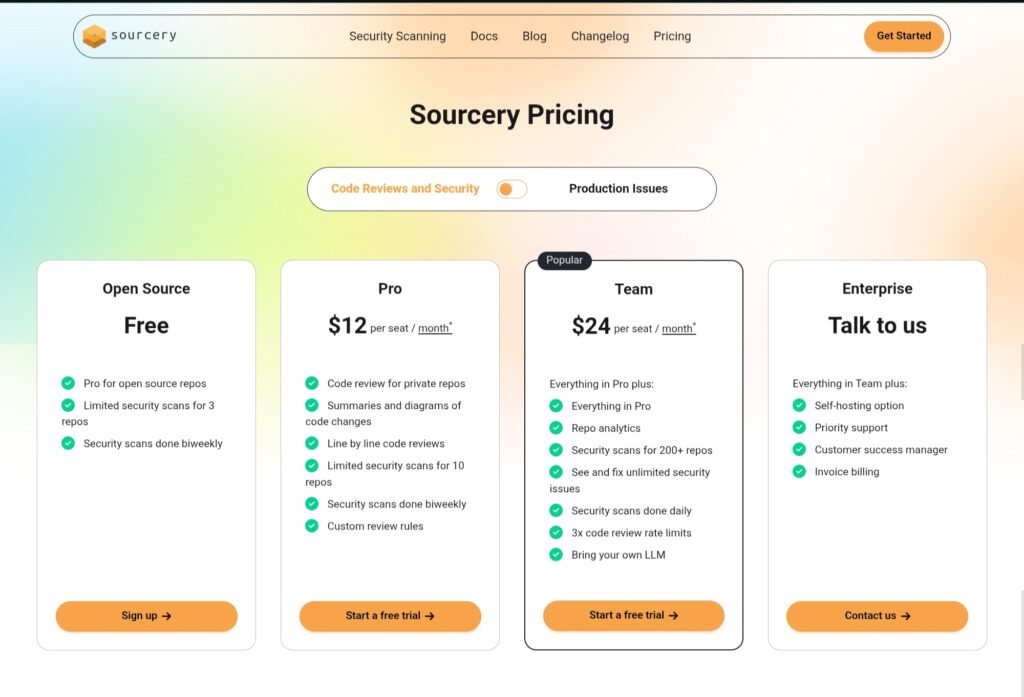
For open source projects and public repositories, Sourcery is free to use. Users can test Sourcery for private repositories for free for 14 days, but after that, they will need to purchase a Team or Pro plan.
The monthly cost of the Pro plan for private repositories is $15 per developer, or $12 per month with the annual plan.
Priority support and upgrades, improved code quality metrics and reporting, and unrestricted access to GitHub repositories are all included with the Pro Plan.
The monthly cost of the Team Plan is $30 for the monthly plan and $24 per month for the annual plan per user.
Custom policies and rules, audit logs, comprehensive analytics, and organization-wide communication capabilities are all available to enterprise clients, along with customized pricing.
10. Augment Code
A sophisticated AI coding aid for professional software engineers working with sizable, intricate codebases, Augment Code is compatible with JetBrains IDEs and Visual Studio Code.
With its industry-leading context engine, the platform positions itself as one of the most potent AI software development platforms.
Augment Code is an expert at comprehending large codebases and provides contextually aware help that goes well beyond simple code completion.
With its better context engine and agents that can fully comprehend your codebase, from a single line to 100 million lines, Augment is an AI copilot that is especially effective for legacy systems and enterprise-level development environments.
Key Features
The primary features of Augment include end-to-end solutions, where it can design, build files, and implement entire features instead of just recommending snippets, and comprehensive project knowledge, where it indexes the entire codebase to provide contextually relevant assistance.
Currently, only Visual Studio Code offers Remote Agent and Augment Agent (200K tokens), whereas JetBrains IDEs provide Augment’s primary chat and autocomplete functionalities.
Additionally, the platform provides the Auggie CLI, which gives you access to Augment’s industry-leading context engine throughout your whole stack, including terminal and continuous integration.
With the help of Augment Code’s cloud-based Remote Agents, you may delegate work while concentrating on other projects.
Benefits for Developers
When dealing with huge, complicated codebases, where typical AI tools have trouble understanding context, Augment Code offers developers tremendous value.
According to users, Augment handles a 3,000-line file as if it were 10 lines long and makes changes with ease, but other programs like Cursor and Windsurf have trouble with lengthy files.
Because Augment gives context and explains its changes, the platform has instructional value and is a great learning tool for developers of all skill levels.
The Remote Agent feature is especially useful for senior developers overseeing several projects at once since it enables developers to assign complicated tasks to AI while still being productive on other projects.
Pricing
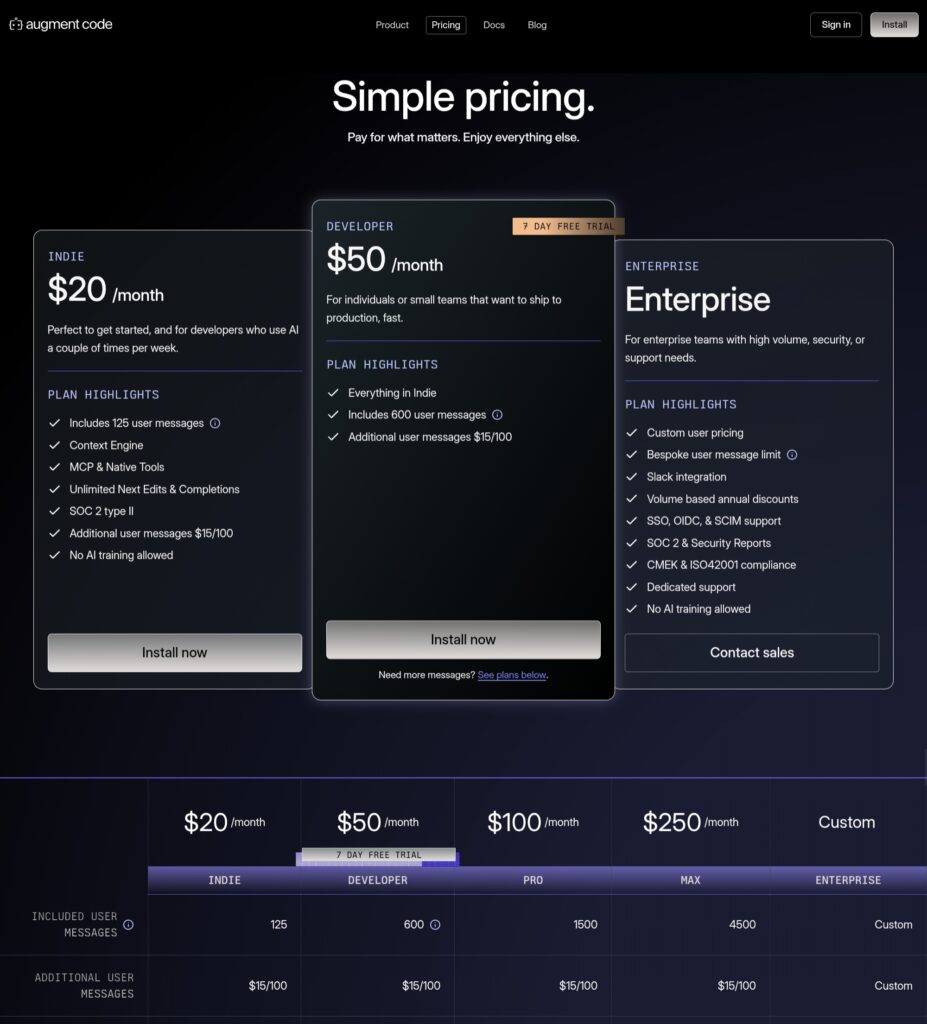
Based on just one metric—User Messages—Augment Code provides four different price levels. Indie, Developer, Pro, and Max are the four price tiers.
The Developer plan costs $50 per month and has 600 messages, while Indie is $20 per month and has a cap of 125 user messages.
The Pro and Max plans, which have 1500 and 4500 messages, respectively, cost $100 and $250 each month.
You can purchase an extra 100 messages for $15 if you run out of user messages.
Large teams and businesses receive specialized support, personalized pricing, and numerous other advantages.
Common Misconceptions About AI Coding Tools
With the growing popularity of AI-assisted coding tools, a number of myths and misconceptions have surfaced. To use these technologies efficiently, developers must comprehend the underlying realities.
Misconception 1: AI will replace developers
Many people worry that human programmers may become obsolete because of AI coding assistants.
Actually, rather than taking the place of human abilities, these tools are meant to enhance them.
Although AI may manage monotonous chores, offer code snippet suggestions, and identify typical mistakes, it is unable to replace a developer’s creativity, problem-solving abilities, or domain-specific knowledge.
Consider AI as a clever coding partner that speeds up and improves your productivity so you can concentrate on intricate reasoning and creative solutions.
Misconception 2: They write perfect code every time
Another widespread misconception is that code produced by AI is perfect. Although AI systems are capable of making precise recommendations, they are not perfect.
Errors can happen, particularly when dealing with intricate situations, specialized libraries, or project-specific specifications.
Before putting any AI-generated code into production, developers must examine, test, and validate it. AI should be viewed as a partner, not a replacement; its recommendations are only beginnings, not answers.
Conclusion
Programming is becoming faster, smarter, and more efficient thanks to AI-assisted coding tools, which are transforming the way developers operate.
You can save time, cut down on errors, and concentrate on innovative problem-solving with the aid of these tools, which range from context-aware code recommendations to automated debugging and documentation.
You may increase productivity, maintain cleaner code, and even pick up new coding techniques by incorporating AI into your workflow.
Experimentation is possibly the most effective method of utilizing AI-assisted coding.
Try the features and advantages that best suit your coding style and process, as each tool has its own advantages.
Whether you’re a novice seeking direction or an experienced developer hoping to streamline your process, there’s an AI tool to enhance your programming experience.
The crucial question now is: which AI coding tool would you choose initially? Try new things, explore, and let AI make coding easier rather than more difficult.
FAQ: AI-Assisted Coding Tools
Can AI coding tools replace developers?
No, AI-powered coding tools cannot replace developers. While developers provide creativity, problem-solving ability, and project-specific expertise, they are intended to supplement human capabilities by managing monotonous activities, recommending code, and spotting problems. Instead of viewing AI as a replacement, consider it a partner in productivity.
How much time can AI-assisted coding save?
By eliminating repetitive chores, providing code recommendations, and automating boilerplate code, AI coding tools can save developers hours of labor every week. Your project’s level of complexity and how much you utilize the AI features will determine how much time you save.
Are AI coding tools suitable for beginners?
Yes! AI-assisted coding has a lot to offer novices. These resources make it simpler to learn programming languages, comprehend coding patterns, and develop confidence when creating code by offering real-time recommendations, code explanations, and examples of best practices.
Which programming languages are best supported by AI tools?
Python, JavaScript, Java, C++, and TypeScript are among the widely used languages supported by the majority of AI coding tools. Before selecting a tool for your workflow, it’s crucial to verify compatibility because some solutions support domain-specific or less widely used languages.
Share Now
More Articles
Best React Courses On Coursera
Best Machine Learning Courses Online
Best C++ Courses & Certifications Online
Discover more from technicalstudies
Subscribe to get the latest posts sent to your email.


